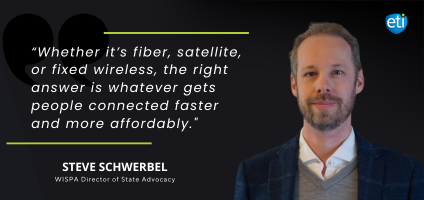
The following summary has been condensed for length and readability. To listen to the full discussion, click here. This episode is sponsored by ETI Software and VETRO FiberMap.
This episode of the Broadband Bunch features a conversation between host Brad Hine and WISPA’s Director of State Advocacy, Steve Schwerbel. With state-level broadband policy evolving rapidly, Schwerbel offers a frontline view of the legislation, challenges, and inspiring grassroots solutions shaping internet access across America.
Steve Schwerbel’s role at WISPA is no small feat—supporting member ISPs across all 50 states as they navigate conversations with broadband offices, legislatures, and governors. His work involves everything from drafting testimony to advising on tax policy and helping providers tell their stories to decision-makers. He describes it as a “game of whack-a-mole” at times, but his passion for connecting underserved communities is evident.
At WISPAmerica 2025, Schwerbel spoke on multiple panels about effective legislative engagement, educating members on how to advocate for themselves, and how to communicate their impact on rural and remote communities.
A key theme in Schwerbel’s message is tech neutrality. WISPA doesn’t advocate for one-size-fits-all solutions like fiber-only or satellite-only models. Instead, the organization champions a pragmatic, flexible approach that includes fixed wireless, satellite, and fiber—all depending on local needs and challenges.
Schwerbel shares compelling stories from the field:
In California, fixed wireless brought internet access to remote farms, enabling smart agriculture and upskilling the local workforce.
During Hurricane Helene, ISPs used a combination of Starlink and fixed wireless to restore service faster than traditional providers.
In tribal communities in New Mexico, grassroots wireless providers launched broadband networks during the pandemic, filling urgent connectivity gaps.
These stories highlight how fixed wireless continues to be a powerful and nimble tool in overcoming both terrain and budgetary constraints.
From eliminating sales tax on broadband equipment to addressing pole access and labor training requirements, state legislatures are grappling with how best to accelerate deployment while managing costs. Schwerbel outlines several key legislative trends:
Tax exemptions for broadband equipment to reduce buildout costs.
Labor certification debates that may impact small ISPs who rely on on-the-job training.
Access rights to vertical and underground infrastructure, often limited to co-ops or utilities, but needed by all providers.
Each state has its own flavor, but the goals are consistent: timely, affordable broadband deployment that serves every corner of the map.
What makes the WISPA community unique? Schwerbel says it’s the DIY spirit. Many of the CEOs in the space started by climbing towers themselves and still do. Whether it’s rigging up connectivity in a forested corner of Wisconsin or restoring service after a storm, the stories showcase the grit and ingenuity of this sector.
Despite the polarization of modern politics, Schwerbel notes that broadband is one of the few truly bipartisan issues. State legislators—red and blue alike—hear daily from constituents who lack connectivity. And with the collective memory of pandemic-era digital divides still fresh, the urgency to act remains high.
As the episode wraps, Schwerbel invites listeners to reach out via WISPA.org or contact him directly to discuss state policy, advocacy strategies, or just to share local broadband stories. Whether you’re an ISP, policymaker, or advocate, Schwerbel is ready to collaborate.
© 2025 Enhanced Telecommunications.